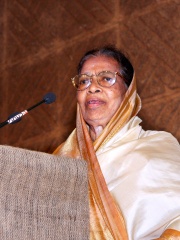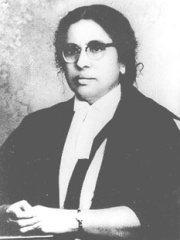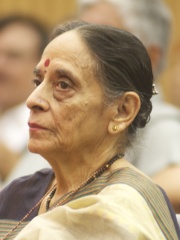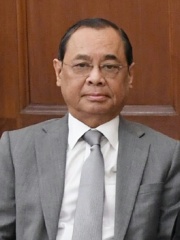



The Most Famous
JUDGES from India
This page contains a list of the greatest Indian Judges. The pantheon dataset contains 53 Judges, 4 of which were born in India. This makes India the birth place of the 3rd most number of Judges behind United States, and Germany.
Top 4
The following people are considered by Pantheon to be the most legendary Indian Judges of all time. This list of famous Indian Judges is sorted by HPI (Historical Popularity Index), a metric that aggregates information on a biography's online popularity.

1. Fathima Beevi (1927 - 2023)
With an HPI of 55.84, Fathima Beevi is the most famous Indian Judge. Her biography has been translated into 22 different languages on wikipedia.
M. Fathima Beevi (30 April 1927 – 23 November 2023) was an Indian judge who was a justice of the Supreme Court of India. Appointed to the apex Court in 1989, she became the first female judge of the Supreme Court of India, and the first Muslim woman to be appointed to any of the higher judiciaries in the country. On her retirement from the court, she served as a member of the National Human Rights Commission and later as the Governor of the Indian state of Tamil Nadu from 1997 to 2001. In 2023, she was honoured with Kerala Prabha Award, the second-highest honour given by the Government of Kerala. In the 2024 honours list, she was posthumously awarded the Padma Bhushan.

2. Anna Chandy (1905 - 1996)
With an HPI of 53.80, Anna Chandy is the 2nd most famous Indian Judge. Her biography has been translated into 21 different languages.
Justice Anna Chandy (1905–1996), also known as Anna Chandi, was the first female judge (1937) and then High Court judge (1959) in India. She was one of the first female judges in the British Empire.

3. Leila Seth (1930 - 2017)
With an HPI of 48.21, Leila Seth is the 3rd most famous Indian Judge. Her biography has been translated into 16 different languages.
Leila Seth (20 October 1930 – 5 May 2017) was an Indian judge who served as the first woman judge on the Delhi High Court and the first woman to become Chief Justice of a state High Court, Himachal Pradesh High Court, on 5 August 1991. She was also the first woman to be designated as a senior counsel by the Supreme Court of India. She sat on a number of enquiry commissions, including one into the death of 'Biscuit Baron' Rajan Pillai, and was also a part of the three-member bench of the Justice Verma Committee that was established to overhaul India's rape laws in the aftermath of the infamous 2012 Delhi gang-rape case. She was a member of the 15th Law Commission of India from 1997 to 2000, and was responsible for the amendments to the Hindu Succession Act that gave equal rights to daughters in joint family property.

4. Ranjan Gogoi (b. 1954)
With an HPI of 44.31, Ranjan Gogoi is the 4th most famous Indian Judge. His biography has been translated into 17 different languages.
Ranjan Gogoi (born 18 November 1954) is an Indian retired jurist and advocate who served as the 46th Chief Justice of India from 2018 to 2019. He is currently a Member of the Rajya Sabha, having been nominated by President Ram Nath Kovind on 16 March 2020. Gogoi previously served as a judge of the Supreme Court of India from 2012 to 2018. He was a judge of the Gauhati High Court from 2001 to 2010, and of the Punjab and Haryana High Court from September 2010 to February 2011 where he later was the Chief Justice from 2011 to 2012. Born and raised in Dibrugarh, Gogoi is from a political family and descends from the Ahom dynasty. His maternal grandparents were both state legislators; his grandmother, Padma Kumari Gohain, was one of the first female MLAs and one of the first female ministers in Assam. His father, Kesab Chandra Gogoi served as the Chief Minister of Assam for two months in 1982. Gogoi is the only chief justice in India to have been the son of a Chief Minister. His mother, Shanti Priya Gogoi, was a prominent social activist who founded an NGO, SEWA, in 2000. One of five children, Gogoi's four siblings also excelled in their respective careers. He is the first chief justice from Northeast India. He studied at Cotton University and later completed his higher studies at the Faculty of Law, University of Delhi. Gogoi enrolled at the bar in 1978 and practised at the Gauhati High Court under advocate JP Bhattacharjee. He began to practise independently in 1991 and became a senior counsel in 1999 at the court. His tenure on the Punjab and Haryana High Court encompassed orders which questioned the CBI’s promotion of SPS Rathore, despite the Ruchika Girhotra case, as well as several other judgements. He was nominated to the Supreme Court in 2012 and was sworn in by S. H. Kapadia. Gogoi made various important judgements during his tenure including the updating of the National Register of Citizens for Assam, and the Soumya Murder case. He also served on the bench that created special courts to try MLAs and MPs, and ruled against the Uttar Pradesh Government law wherein former Chief Ministers are allowed to occupy government bungalows. He was appointed the Chief Justice of India in 2018 and served until 2019. During his tenure, he oversaw numerous more significant judgements, including the judgement on the Ayodhya dispute and the Rafale deal, before retiring in 2019. In 2020 he was nominated to the Rajya Sabha, and has served on the committee on communications and information technology, and the committee on external affairs. A pivotal figure in Indian judicial history, Gogoi's legacy is the subject of scholarly debate amongst sources. He has been accredited with institutional reforms and delivery on landmark judgements, most notably the 134-year old Ayodhya dispute, while his nomination to Parliament sparked national debate. As a judge, he was known for his "no-nonsense" approach and advocacy for greater judicial transparency and reduction in case pendency. Gogoi is the third Supreme Court judge to serve in the Rajya Sabha, after Ranganath Misra and Baharul Islam, and the first to be nominated to his seat. He published his autobiography, Justice for the Judge, in 2021, and was awarded the Assam Baibhav, the state's highest civilian award, for 2023. The Indian Express named him as India's third most powerful person of 2019, behind only Amit Shah and Narendra Modi.
People
Pantheon has 4 people classified as Indian judges born between 1905 and 1954. Of these 4, 1 (25.00%) of them are still alive today. The most famous living Indian judges include Ranjan Gogoi. The most famous deceased Indian judges include Fathima Beevi, Anna Chandy, and Leila Seth.
Living Indian Judges
Go to all RankingsDeceased Indian Judges
Go to all RankingsOverlapping Lives
Which Judges were alive at the same time? This visualization shows the lifespans of the 3 most globally memorable Judges since 1700.

